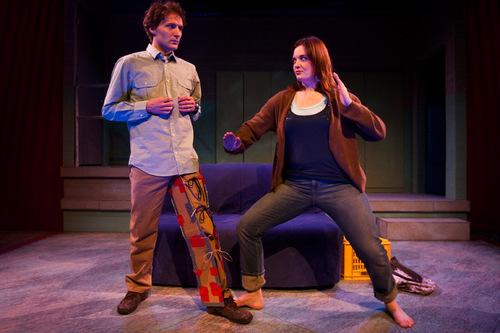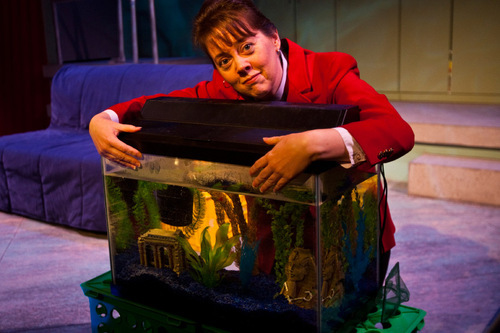This is an archived article that was published on sltrib.com in 2010, and information in the article may be outdated. It is provided only for personal research purposes and may not be reprinted.
There are at least two reasons arts snobs might choose to avoid Salt Lake Acting Company's "boom," born from the pen of acclaimed playwright Peter Sinn Nachtrieb.
First, it's a blatant attempt to blend science with drama, opening with a quote from famed evolutionary biologist Richard Dawkins. As such, it violates one of the playwright's most time-honored rules: Thou shalt not sully art with ulterior message.
Second, it embraces a whole kitchen sink's worth of props and plot devices. A timpani, fish tank, fallout shelter and survivalist food-storage locker are all kicked into motion by online dating then sustained by an Oz-like third character pulling offstage levers.
Avoid "boom" on either count, though, and you'd be making a big mistake.
Much like evolutionary biology itself, it's ripe with moments of natural selection. The kind of dramatic evolution, that is, in which word and action adapt and form a new living organism capable of charting a discernible, even charming, direction.
For bonus points, it also opens with one of the steamiest scenes in contemporary theater, punctuated throughout with screwball exclamation points.
David Fetzer, who acted in SLAC's 2004 production of David Lindsay-Abaire's "Kimberly Akimbo," considered that play an 8 on a 1-to-10 scale of wackiness. Then he read the script for "boom."
"This is a full-on 10," said Fetzer, who plays marine biologist Jules in SLAC's production, which opens Nov. 3. "It takes the cake for wackiness in terms of anything I've ever acted in."
And coming from Fetzer, whom local audiences will remember for his exuberant portrayal of Everett Ruess in Plan-B Theatre's 2008 production of "The End of the Horizon," that's a compliment.
"boom" has received 17 productions since its January 2008 world premiere at Ars Nova theater Off Broadway in New York City, a breathless clip for a play barely 2 years old. According to the Theatre Communications Group, the national association of nonprofit theaters, "boom" was the most produced play in the United States for the 2009-10 theater season, excluding Shakespeare and holiday-themed productions.
Now based in San Francisco, Nachtrieb is a 36-year-old graduate of Brown University who double-majored in theater and biology. He has made the subject of science into his own brand of drama. "boom," his fourth play, is his paean to the wonder and glory of evolution. That followed "Hunters and Gatherers," which cast two married couples at a dinner party where the conversation devolves into sex and violence until only one person's left standing.
Nachtrieb, in a phone interview, said he traded the biology lab for the playwright's lab because he wanted to broaden the scope of his questions, not just answer questions in the narrow frame of designing experiments.
"Whenever I read Dawkins, I found there was so much passion in what he writes," Nachtrieb said. "He almost struck me as a romantic when it came to science. Creation, and how life came into being, is such a great story that I wanted to convey the beauty of a scientific view. Why is it that it's not every bit as beautiful as the creation myths we know?"
Set in a marine biology lab that doubles as a sort of fallout shelter, "boom" pairs journalism student Jo with marine biologist Jules. The two consummate a series of arguments about death, a fish named Dorothy, and whether or not online dating holds the key to humanity's future. The language is often tart and graphic, but never crude for its own sake.
"Random sex [is] the last glimmer of hope in a decaying society," Jo tells Jules. "Alone, on laptops in isolated homes, a series of e-mails or an online chat bring two or more people together for a brief moment in time. … In no-strings sex, hope is still possible."
Barbara, the play's nametag-clad character, pulls levers and pushes buttons that freeze Jo and Jules so she might explain events in the fashion of a godlike prime mover. As the dramatic arc progresses, alas, it's obvious that she may have all the observational skills of a scientist, but something much larger and more mysterious is in control.
For Nachtrieb, the chance elements that produce species by natural selection are the same chance elements that determine whether human relationships survive or die. The big questions of life, and life's inner meanings, are reduced to the small scale, but with lots of physical acting.
"It's really a love letter to the randomness of the way things work," said Emily Burnworth, the 24-year-old actor and native of central Pennsylvania who plays Jo. "And it's definitely a play with roles you can't be shy about. There's a lot of jumping, a lot of falling down, and a lot of sex and yelling. I told David during the early stages of rehearsals that he was going to have to get used to my spit."
Salt Lake Acting Company goes "boom"
P The contemporary theater company presents a new play by Peter Sinn Nachtrieb, which producers describe as a "quirky, sci-fi, not-so-romantic comedy." The show is directed by Robin Wilks-Dunn and features Emily Burnworth, David Fetzer and Holly Fowers.
When • Previews Nov. 3 and 4, opens Nov. 5, continuing through Dec. 5; 7:30 p.m. Wednesday-Saturday, and 2-7 p.m. Sunday
Where • Salt Lake Acting Company, 168 W. 500 North, Salt Lake City
Info • Tickets are $15-$41. Call 801-363-7522 for more information, or visit http://www.saltlakeactingcompany.org.
Note • The play contains adult themes and language.





